新标准大学英语综合教程2答案翻译全
新标准大学英语综合教程第二册 课文译文与翻译参考答案
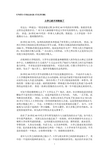
UNIT1 COLLEGE CULTURE大学已经不再特别了有这么一种说法:“要是你能记得20世纪60年代的任何事情,你就没有真正经历过那段岁月。
” 对于在大麻烟雾中度过大学时光的那些人,这话可能是真的。
但是,20世纪60年代有一件事人人都记得,那就是:上大学是你一生中最激动人心、最刺激的经历。
20世纪60年代,加州的高校把本州变成了世界第七大经济实体。
然而,加州大学的主校园伯克利分校也以学生示威、罢课以及激进的政治氛围而著名。
1966年,罗纳德•里根竞选加州州长,他问加州是否允许“一所伟大的大学被喧闹的、唱反调的少数人征服。
” 自由派人士回答说,大学之所以伟大正是因为它们有能力容忍喧闹的、唱反调的少数人。
在欧洲的大学校园里,大学生以新的姿态和激情投入到争取自由和正义的事业中去,大规模的社会主义或共产主义运动引发了他们与当权者之间日益升级的暴力冲突。
许多抗议是针对越南战争的。
可是在法国,巴黎大学的学生与工会联盟,发动了一场大罢工,最终导致戴高乐总统辞职。
20世纪60年代大学生活的特点并不仅仅是激进的行动。
不论在什么地方,上大学都意味着你初次品尝真正自由的滋味,初次品尝深更半夜在宿舍或学生活动室里讨论人生意义的滋味。
你往往得上了大学才能阅读你的第一本禁书,看你的第一部独立影人电影,或者找到和你一样痴迷吉米•亨德里克斯或兰尼•布鲁斯的志同道合者。
那是一段难以想象的自由时光,你一生中最无拘无束的时光。
可如今那份激情哪儿去了?大学怎么了?现在,政治、社会和创造意识的觉醒似乎不是凭借大学的助力,而是冲破其阻力才发生的。
当然,一点不假,高等教育仍然重要。
例如,在英国,布莱尔首相几乎实现了到2010年让50%的30岁以下的人上大学的目标(即使愤世嫉俗的人会说,这是要把他们排除在失业统计数据之外)。
不过,大学教育已不再是全民重视的话题了。
如今,大学被视为人们急于逃离的一种小城镇。
有些人辍学,但大多数已经有些麻木,还是坚持混到毕业,因为离开学校实在是太费事了。
新标准大学英语(第二版)综合教程2-Unit-6-A篇练习答案及课文翻译

Text
2 Part of the explanation for bad luck is mathematical, but part is psychological. Indeed there is a very close connection between people’s perception of bad luck and interesting coincidences. 3 For example, take the belief that “bad things always happen in threes” (just like buses ...!) This popular notion would be unlikely to stand the scrutiny of any scientific study, but it must have some basis in experience, otherwise the phrase would never have arisen in the first place. What might be the rational explanation?
3. Do you believe one bad leads to another? Open answer.
4. Have you ever run into any unlucky things? Open ansБайду номын сангаасer.
Text
Can bad luck be explained?
Text
Key
Warming Up
1. Do you think the men unlucky? Yes.
新标准大学英语综合教程2 Language in use 翻译答案
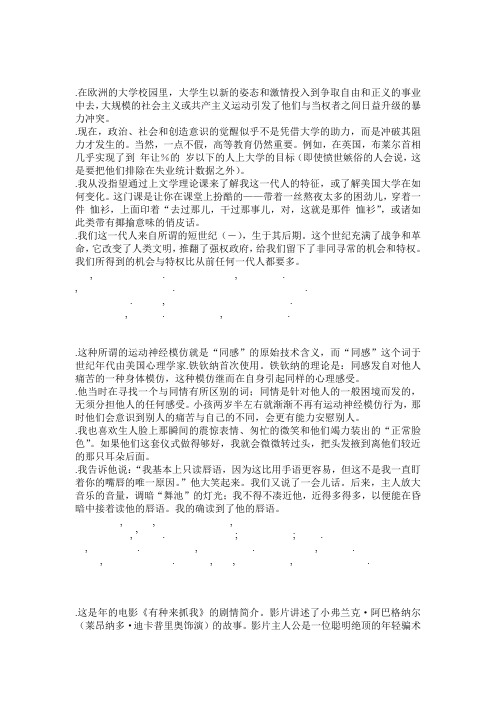
.在欧洲的大学校园里,大学生以新的姿态和激情投入到争取自由和正义的事业中去,大规模的社会主义或共产主义运动引发了他们与当权者之间日益升级的暴力冲突。
.现在,政治、社会和创造意识的觉醒似乎不是凭借大学的助力,而是冲破其阻力才发生的。
当然,一点不假,高等教育仍然重要。
例如,在英国,布莱尔首相几乎实现了到年让%的岁以下的人上大学的目标(即使愤世嫉俗的人会说,这是要把他们排除在失业统计数据之外)。
.我从没指望通过上文学理论课来了解我这一代人的特征,或了解美国大学在如何变化。
这门课是让你在课堂上扮酷的——带着一丝熬夜太多的困劲儿,穿着一件恤衫,上面印着“去过那儿,干过那事儿,对,这就是那件恤衫”,或诸如此类带有揶揄意味的俏皮话。
.我们这一代人来自所谓的短世纪(-),生于其后期。
这个世纪充满了战争和革命,它改变了人类文明,推翻了强权政府,给我们留下了非同寻常的机会和特权。
我们所得到的机会与特权比从前任何一代人都要多。
, . , ., . .. , ., . , ..这种所谓的运动神经模仿就是“同感”的原始技术含义,而“同感”这个词于世纪年代由美国心理学家.铁钦纳首次使用。
铁钦纳的理论是:同感发自对他人痛苦的一种身体模仿,这种模仿继而在自身引起同样的心理感受。
.他当时在寻找一个与同情有所区别的词;同情是针对他人的一般困境而发的,无须分担他人的任何感受。
小孩两岁半左右就渐渐不再有运动神经模仿行为,那时他们会意识到别人的痛苦与自己的不同,会更有能力安慰别人。
.我也喜欢生人脸上那瞬间的震惊表情、匆忙的微笑和他们竭力装出的“正常脸色”。
如果他们这套仪式做得够好,我就会微微转过头,把头发掖到离他们较近的那只耳朵后面。
.我告诉他说:“我基本上只读唇语,因为这比用手语更容易,但这不是我一直盯着你的嘴唇的唯一原因。
”他大笑起来。
我们又说了一会儿话。
后来,主人放大音乐的音量,调暗“舞池”的灯光;我不得不凑近他,近得多得多,以便能在昏暗中接着读他的唇语。
【最新精选】新标准大学英语综合教程2中译英(UNIT1-8)

Unit 11 政府采取的一系列措施不但没有化解矛盾,反倒激起更多的暴力冲突。
反对党联合工会发动了一次大罢工,最终导致政府的垮台。
( give rise to; form an alliance with; launch; bring about)Instead of resolving contradictions, the series of measures taken by the government gave rise to more violent clashes. The Opposition formed an alliance with the trade unions and launched a general strike, which ultimately brought about the downfall of the government.2 如今,大学与现实世界的距离越来越小,学生也变得越来越实际。
从前,大学是一象牙塔,学者追求的是学问本身而不是把学问作为达到目的的手段,但这样的时代已经一去不复返了。
( shrink; gone are the days; a means to an end) Nowadays, the gap between the university and the real world is shrinking and the students are becoming more and more practical. Gone are the days when the university was an ivory tower in which scholars pursued knowledge as an end rather than a means to an end.3 我从未指望靠上课来学好这门课。
但我确实去听课,因为在课上我能了解这门课的重点,学会如何组织材料、如何推理。
新标准大学英语(第二版)综合教程2-Unit-6-A篇练习答案及课文翻译

4. Have you ever run into any unlucky things? Open answer.
Text
Can bad luck be explained?
Text
Text
12 You are off to visit a friend who lives at the other end of the city. You look up the road in the street atlas, and discover that it is right on the edge of the page. This means that finding the precise route becomes a chore of flicking backwards and forwards from one page to the next. Either the road is half on one page and half on the other, or it's spread across the fold in the middle of the book. And if it’s an ordnance survey map, then your destination is at just the point where you folded the map over.
Text
7 Whenitcomestobadthingshappeninginthrees,whatmaybemostimportant of all is the duration and memorability of the first event. Take a burst pipe while you are away on holiday, for example. It may take less than an hour to flood the house, but this one bad event can remain alive and kicking for many months, with the cleaning up operation and the debate with your insurers acting as constant reminders of the original event.
新标准大学英语综合教程(2)原文及翻译
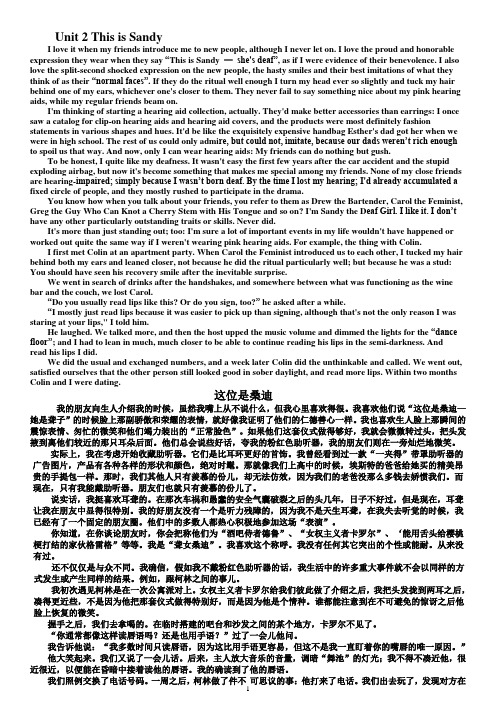
Unit 2 This is SandyI love it when my friends introduce me to new people, although I never let on. I love the proud and honorable expression they wear when they say “This is Sandy—she's deaf”, as if I were evidence of their benevolence. I also love the split-second shocked expression on the new people, the hasty smiles and their best imitations of what they think of as their “normal faces”. If they do the ritual well enough I turn my head ever so slightly and tuck my hair behind one of my ears, whichever one's closer to them. They never fail to say something nice about my pink hearing aids, while my regular friends beam on.I'm thinking of starting a hearing aid collection, actually. They'd make better accessories than earrings: I once saw a catalog for clip-on hearing aids and hearing aid covers, and the products were most definitely fashion statements in various shapes and hues. It'd be like the exquisitely expensive handbag Esther's dad got her when we were in high school. The rest of us could only admi re, but could not, imitate, because our dads weren’t rich enoughto spoil us that way. And now, only I can wear hearing aids: My friends can do nothing but gush.To be honest, I quite like my deafness. It wasn't easy the first few years after the car accident and the stupid exploding airbag, but now it's become something that makes me special among my friends. None of my close friends are hearing-impaired; simply because I wasn’t born deaf. By the time I lost my hearing; I'd already accumulated a fixed circle of people, and they mostly rushed to participate in the drama.You know how when you talk about your friends, you refer to them as Drew the Bartender, Carol the Feminist, Greg the Guy Who Can Knot a Cherry Stem with His Tongue and so on? I'm Sandy the D eaf Girl. I like it. I don’t have any other particularly outstanding traits or skills. Never did.It's more than just standing out; too: I'm sure a lot of important events in my life wouldn't have happened or worked out quite the same way if I weren't wearing pink hearing aids. For example, the thing with Colin.I first met Colin at an apartment party. When Carol the Feminist introduced us to each other, I tucked my hair behind both my ears and leaned closer, not because he did the ritual particularly well; but because he was a stud: You should have seen his recovery smile after the inevitable surprise.We went in search of drinks after the handshakes, and somewhere between what was functioning as the wine bar and the couch, we lost Carol.“Do you usually read lips like this? Or do you sign, too?” he asked after a while.“I mostly just read lips because it was easier to pick up than signing, although that's not the only reason I was staring at your lips," I told him.He laughed. We talked more, and then the host upped the music volume and dimmed the lights for the “dance floor”; and I had to lean in much, much closer to be able to continue reading his lips in the semi-darkness. Andread his lips I did.We did the usual and exchanged numbers, and a week later Colin did the unthinkable and called. We went out, satisfied ourselves that the other person still looked good in sober daylight, and read more lips. Within two months Colin and I were dating.这位是桑迪我的朋友向生人介绍我的时候,虽然我嘴上从不说什么,但我心里喜欢得很。
新标准综合教程2课后翻译
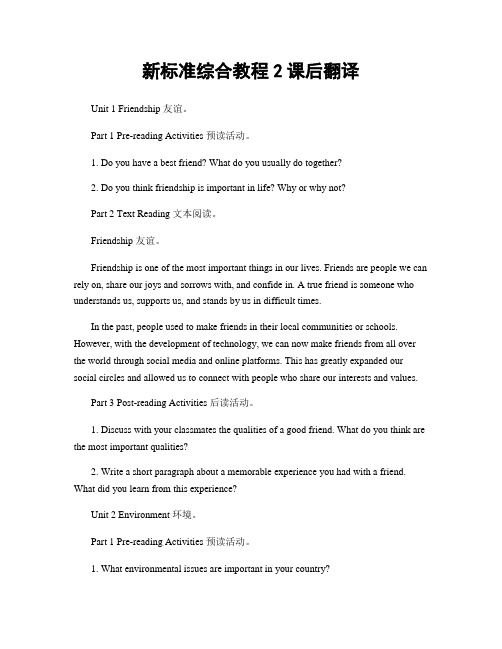
新标准综合教程2课后翻译Unit 1 Friendship 友谊。
Part 1 Pre-reading Activities 预读活动。
1. Do you have a best friend? What do you usually do together?2. Do you think friendship is important in life? Why or why not?Part 2 Text Reading 文本阅读。
Friendship 友谊。
Friendship is one of the most important things in our lives. Friends are people we can rely on, share our joys and sorrows with, and confide in. A true friend is someone who understands us, supports us, and stands by us in difficult times.In the past, people used to make friends in their local communities or schools. However, with the development of technology, we can now make friends from all over the world through social media and online platforms. This has greatly expanded our social circles and allowed us to connect with people who share our interests and values.Part 3 Post-reading Activities 后读活动。
新标准大学英语综合教程2 1-10 课后翻译、答案及课文翻译
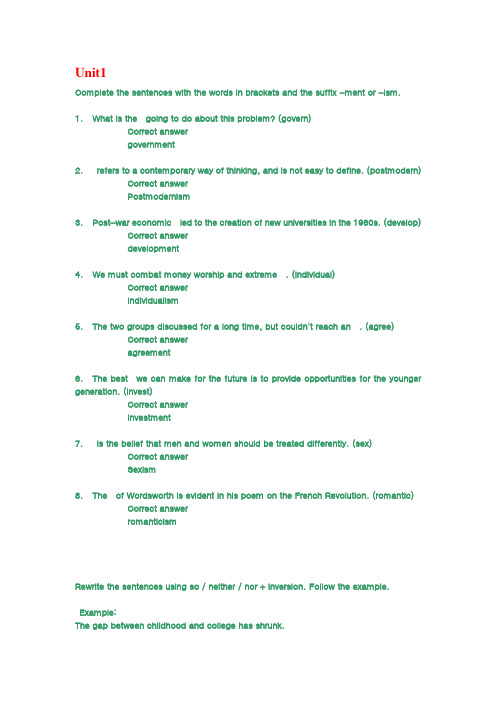
Unit1Complete the sentences with the words in brackets and the suffix -ment or -ism.1. What is the going to do about this problem? (govern)Correct answergovernment2. refers to a contemporary way of thinking, and is not easy to define. (postmodern)Correct answerPostmodernism3. Post-war economic led to the creation of new universities in the 1960s. (develop)Correct answerdevelopment4. We must combat money worship and extreme . (individual)Correct answerindividualism5. The two groups discussed for a long time, but couldn't reach an . (agree)Correct answeragreement6. The best we can make for the future is to provide opportunities for the younger generation. (invest)Correct answerinvestment7. is the belief that men and women should be treated differently. (sex)Correct answerSexism8. The of Wordsworth is evident in his poem on the French Revolution. (romantic)Correct answerromanticismRewrite the sentences using so / neither / nor + inversion. Follow the example.Example:The gap between childhood and college has shrunk.The gap between college and the real world has shrunk, too.The gap between childhood and college has shrunk, and so has the gap between college and the real world.1. The world has changed a lot since the 1960s. Universities have changed a lot, too. Suggested answer:The world has changed a lot since the 1960s, and so have universities.2. I really enjoyed my years at university. Jackie also enjoyed the time she spent at university.Suggested answer:I really enjoyed my years at university, and so did Jackie.3. Choosing the right course is always a major problem for new students. Another major problem is organizing one's time on campus.Suggested answer:Choosing the right course is always a major problem for new students, and so is organizing one's time on campus.4. I'm thinking of going to the lecture on post-colonial literature. Li Ming is thinking of going, too.Suggested answer:I'm thinking of going to the lecture on post-colonial literature, and so is Li Ming.5. I think the facilities in our college have improved over the last few years. In my opinion the teaching has also got better.Suggested answer:I think the facilities in our college have improved over the last few years, and so has the teaching.6. We can access the Internet in our student hostel, and it's the same for everyone else on campus.Suggested answer:We can access the Internet in our student hostel, and so can everyone else on campus.7. I'm not very interested in politics. My friends aren't either.Suggested answer:I'm not very interested in politics, nor are my friends.8. I won't be doing much tonight. My roommate won't be doing much either. Suggested answer:I won't be doing much tonight, nor will my roommate.Rewrite the sentences using mean. Follow the example.Example:When you went to college you had your first taste of real freedom.Going to college meant your first taste of real freedom.1. When you start out at college you meet lots of interesting people.Suggested answer:Starting out at college means meeting lots of interesting people.2. If you go to bed too late you won't be able to concentrate the next day.Suggested answer:Going to bed too late means not being able to concentrate the next day.3. When you do a course in Lit Theory you spend a lot of time on difficult subjects. Suggested answer:Doing a course in Lit Theory means spending a lot of time on difficult subjects.4. To be interested in literature is to have an open mind about other ways of life. Suggested answer:Being interested in literature means having an open mind about other ways of life.5. To protest against the Vietnam War in the 1960s you went out onto the streets. Suggested answer:Protesting against the Vietnam War in the 1960s meant going out onto the streets.6. When you go to college today you spend a lot of time thinking about what you will do afterwards.Suggested answer:Going to college today means spending a lot of time thinking about what you will do afterwardsTranslate the sentences into Chinese.1. On university campuses in Europe, mass socialist or communist movements gave rise to increasingly violent clashes between the establishment and the college students, with their new and passionate commitment to freedom and justice.Suggested answer:在欧洲的大学校园里,大学生以新的姿态和激情投入到争取自由和正义的事业中去,大规模的社会主义或共产主义运动引发了他们与当权者之间日益升级的暴力冲突。
新标准大学英语第二版综合教程2 Unit 3 A篇练习答案及课文翻译
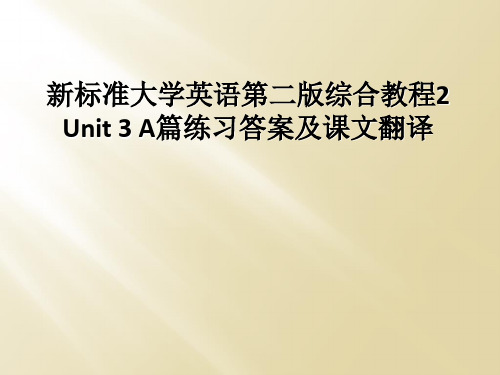
1 What are the most popular sports in China? 2 Do you think foreigners can understand Chinese sports
such as t’ai chi and kung fu? 3 Do you understand foreign sports, such as football and
Text
4 How much do you think national culture is reflected in sports? I believe participating in sports is a very important way to publicize, popularize and develop a national culture. Through sports, the nation shows its sporting spirit, and also the condition of its sports facilities, which indicate the general quality of life. For example, the 2008 Beijing Olympic Games and Para-Olympics were successful sporting events which showed how the Chinese nation is keen to implement its motto of “One World, One Dream”.
2. What are the differences between American football and soccer?
新标准大学英语第二版综合教程2 Unit 2 B篇练习答案及课文翻译
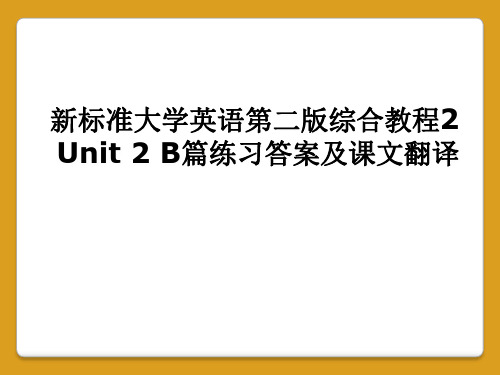
Go to the text
Text
Daniel Goleman (born March 7, 1946) is an author, psychologist, and science journalist. For 12 years, he wrote for The New York Times, specializing in psychology and brain sciences. He is the author of more than 10 books on psychology, education, science, and leadership.
Everyone knows that high IQ is no guarantee of success, happiness, or virtue, but until Emotional Intelligence, we could only guess why. Daniel Goleman’s brilliant report from the frontiers of psychology and neuroscience offers startling new insight into our “two minds” — the rational and the emotional —and how they together shapemoney to help the victims of a natural disaster
s
6. crying at the end of a film e
Text
How empathy unfolds
The author
Background information
新标准大学英语(第二版)综合教程2 Unit 1 A篇练习答案及课文翻译
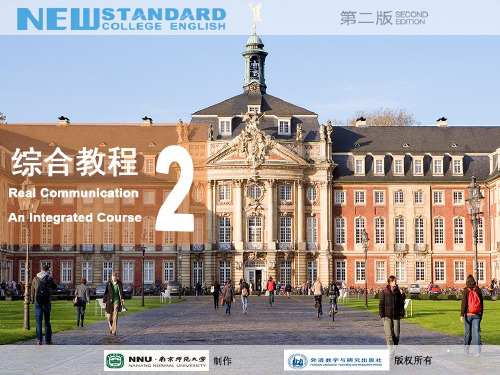
Active Reading 1
Warming Up
Oral practice
Task 1: Talk about your college life
Task 2: Discuss questions
Watching and listening
Task 3: Dictation Task 4: Blank-filling Task 5: Answer the questions
2. How do you think it has changed?
Warming Up
Task 2 Work in pairs and discuss the two questions.
1. What do you think student life was like in the 1960s?
Warming Up
Watching and Listening
You are going to do three tasks on University of California at Berkeley. Learn some new words about it. flagship n. 旗舰 municipality n. 市政当局 acclaimed a. 令人称赞的 laureate n. 获奖者 Peace Corps volunteers 维和部队志愿者
4. What is the motto of UC Berkeley?
The university’s motto is Fiat Lux (Latin) or “Let there be light”.
Warming Up
5. What are UC Berkeley students taught to do? Berkeley students are taught to look at the world as how it ought to be instead of how it is or how it was. 6. What word can be used to define Berkeley students or faculty? Passion.
新标准大学英语(第二版)综合教程2 Unit 3 B篇练习答案及课文翻译

Text
2
My heart was beating loudly, my mouth was dry and the adrenaline
was pumping. I was so close to the realisation of my childhood
dream and the feeling was fantastic; it was completely exhilarating,
Text
7
I knew I would do my best, that I would run my heart out and finish the race. I felt the performer in me move in and take over. I had just two laps to run, that was all. Just two laps until the emotional and physical strain of the past two days and the last
jump just a couple of hours earlier, but I shut out all thoughts of
pain. I tried to concentrate on the crowd. They were so vocal. My spirits lifted and I felt composed.
28 years would be eclipsed by victory or failure. This race was all
about survival. It’s only two minutes, I kept telling myself, anyone can run for two minutes.
新标准大学英语第二版综合教程2 Unit 4 A篇练习答案及课文翻译

Warming Up
William
Sydney
Porter
(September 11, 1862 – June 5,
1910), known by his pen name O.
Henry, was an American short
story writer, who wrote about the
Warming Up
➢ The Furnished Room is perhaps the bleakest of O. Henry’s best-known stories. The basic ironic plot can be summarized in a sentence — a young man commits suicide in the same room where a young woman for whom he has vainly searched killed herself. The fact that the young man ends up in the very same room in which his lost sweetheart took her life is one of the most extreme coincidences in all of O. Henry’s fiction. It is a story of transience, of lives that move through a bleak, indifferent world, leaving only bits of themselves.
Warming Up
➢The Gift of the Magi is about a young couple who are short of money but desperately want to buy each other Christmas gifts. Unbeknownst to Jim, Della sells her most valuable possession, her beautiful hair, in order to buy a platinum fob chain for Jim’s watch; while unbeknownst to Della, Jim sells his own most valuable possession, his watch, to buy jeweled combs for Della’s hair. The essential premise of this story has been copied, re-worked, parodied, and otherwise re-told countless times in the century since it was written.
新标准大学英语综合教程2课后题翻译答案(英译汉,汉译英)题目答案一体的哦
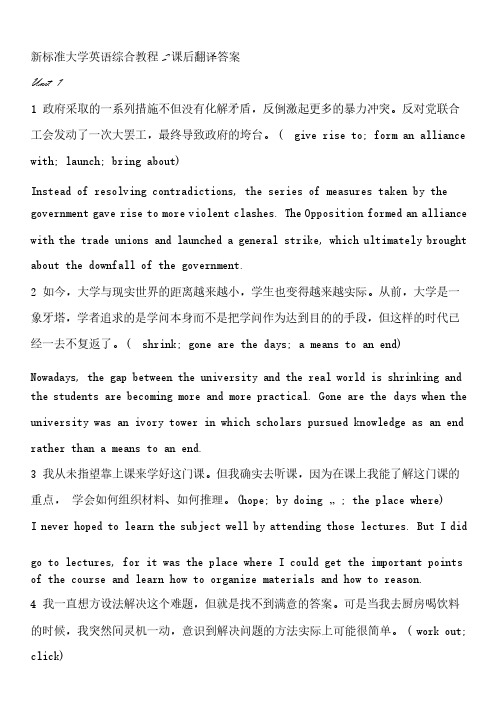
新标准大学英语综合教程2课后翻译答案课后翻译答案Unit 11 1 政府采取的一系列措施不但没有化解矛盾,反倒激起更多的暴力冲突。
反对党联合政府采取的一系列措施不但没有化解矛盾,反倒激起更多的暴力冲突。
反对党联合工会发动了一次大罢工,最终导致政府的垮台。
( give rise to; form an alliance with; launch; bring about)Instead of resolving contradictions, the series of measures taken by the government gave rise to more violent clashes. The Opposition formed an alliance with with the trade unions the trade unions the trade unions and launched a general and launched a general and launched a general strike, strike, strike, which which which ultimately ultimately ultimately brought brought about the downfall of the government.2 2 如今,大学与现实世界的距离越来越小,学生也变得越来越实际。
从前,大学是一如今,大学与现实世界的距离越来越小,学生也变得越来越实际。
从前,大学是一象牙塔,学者追求的是学问本身而不是把学问作为达到目的的手段,但这样的时代已经一去不复返了。
经一去不复返了。
( shrink; gone are the days; a means to an end) ( shrink; gone are the days; a means to an end)Nowadays, the gap between the university and the real world is shrinking and the students are students are becoming more and becoming more and becoming more and more practical. Gone are the more practical. Gone are the more practical. Gone are the days days days when when when the the university was an ivory tower in which scholars pursued knowledge as an end rather than a means to an end.3 3 我从未指望靠上课来学好这门课。
新标准大学英语综合教程2课后题翻译答案
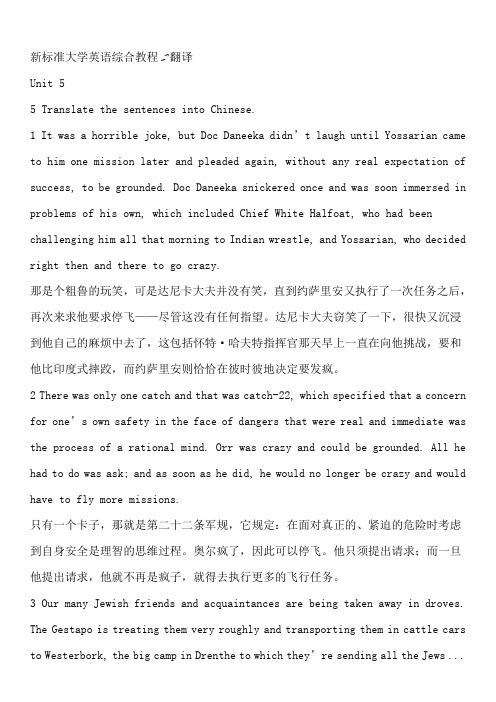
新标准大学英语综合教程2翻译Unit 55 Translate the sentences into Chinese.1 It was a horrible joke, but Doc Daneeka didn’t laugh until Yossarian came to him one mission later and pleaded again, without any real expectation of success, to be grounded. Doc Daneeka snickered once and was soon immersed in problems of his own, which included Chief White Halfoat, who had been challenging him all that morning to Indian wrestle, and Yossarian, who decided right then and there to go crazy.那是个粗鲁的玩笑,可是达尼卡大夫并没有笑,直到约萨里安又执行了一次任务之后,再次来求他要求停飞——尽管这没有任何指望。
达尼卡大夫窃笑了一下,很快又沉浸到他自己的麻烦中去了,这包括怀特·哈夫特指挥官那天早上一直在向他挑战,要和他比印度式摔跤,而约萨里安则恰恰在彼时彼地决定要发疯。
2 There was only one catch and that was catch-22, which specified that a concern for one’s own safety in the face of dangers that were real and immediate was the process of a rational mind. Orr was crazy and could be grounded. All he had to do was ask; and as soon as he did, he would no longer be crazy and would have to fly more missions.只有一个卡子,那就是第二十二条军规,它规定:在面对真正的、紧迫的危险时考虑到自身安全是理智的思维过程。
新标准大学英语综合教程2_Unit6 翻译、答案及课文翻译 2
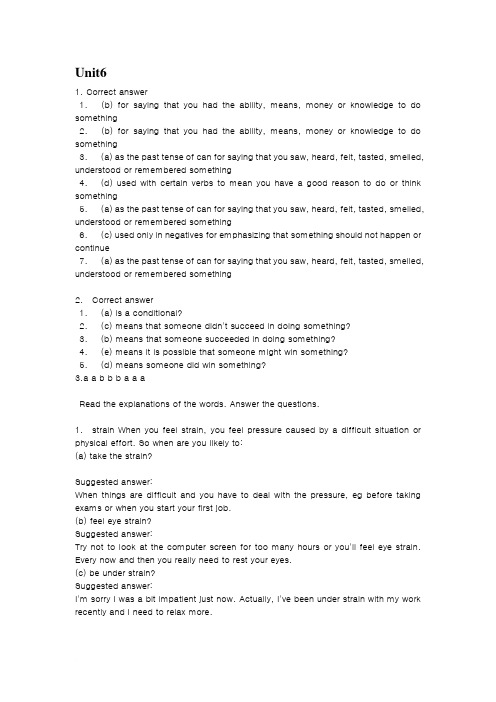
Unit61. Correct answer1. (b) for saying that you had the ability, means, money or knowledge to do something2. (b) for saying that you had the ability, means, money or knowledge to do something3. (a) as the past tense of can for saying that you saw, heard, felt, tasted, smelled, understood or remembered something4. (d) used with certain verbs to mean you have a good reason to do or think something5. (a) as the past tense of can for saying that you saw, heard, felt, tasted, smelled, understood or remembered something6. (c) used only in negatives for emphasizing that something should not happen or continue7. (a) as the past tense of can for saying that you saw, heard, felt, tasted, smelled, understood or remembered something2. Correct answer1. (a) is a conditional?2. (c) means that someone didn't succeed in doing something?3. (b) means that someone succeeded in doing something?4. (e) means it is possible that someone might win something?5. (d) means someone did win something?3.a a b b b a a aRead the explanations of the words. Answer the questions.1. strain When you feel strain, you feel pressure caused by a difficult situation or physical effort. So when are you likely to:(a) take the strain?Suggested answer:When things are difficult and you have to deal with the pressure, eg before taking exams or when you start your first job.(b) feel eye strain?Suggested answer:Try not to look at the computer screen for too many hours or you'll feel eye strain. Every now and then you really need to rest your eyes.(c) be under strain?Suggested answer:I'm sorry I was a bit impatient just now. Actually, I've been under strain with my work recently and I need to relax more.(d) find it is a strain to hear something?Suggested answer:Do you mind turning the music down just a little bit? I've got a splitting headache andI find it's a strain to hear heavy rock music just at the moment ... That's better, thanks!2. stretch When you stretch something you make it as long or as straight as possible.(a) What does it look like when you stretch out your arms?Suggested answer:It could look like a large cross or perhaps as if you're trying to give someone a warm welcome, with a hug.(b) What do you do when you stretch your legs?Suggested answer:It normally means that you go out for a short walk, but occasionally it means that you stretch your legs out straight from a sitting position, eg when you are sitting on a plane.(c) What is the traffic like if it stretches as far as the eye can see?Suggested answer:It's bad! It means that there is a long line of vehicles, like a traffic jam, going right into the far distance.(d) How do you feel when someone stretches your patience?Suggested answer:You feel a bit frustrated or annoyed or even angry, but you do your best to stay in control and stay patient.3. clue A clue is an object or fact which helps you solve a crime or mystery.(a) What is a crossword clue?Suggested answer:It's a word or phrase that helps you to find the answer in a crossword — a word game in which the answers are written in words in rows of squares that cross each other. Generally, some letters in one word appear in another word. The clues can be easy or difficult: Difficult ones often have tricks with words, double meanings or references to wide general knowledge.(b) How much do you know or understand if you don't have a clue?Suggested answer:If you haven't got a clue, then you don't know or understand much at all!4. punch A punch is an act of hitting someone or something as hard as you can.(a) Which part of a joke is the punch line?Suggested answer:The punch line is usually the last few words of a joke that make the joke funny. (b) What happens in a punch-up?Suggested answer:People fight in a rough or violent way (punching each other).(c) What do you do if you pull your punches?Suggested answer:You express something negative a lot less strongly because, say, you do not want to upset or shock people, so you are gentler with your words (pull means pull back, to limit or stop a punch). "Don't pull your punches" is the opposite: You express yourfeelings, opinions or criticism very clearly, without considering other people's feelings at all.Translate the sentences into Chinese.1. The rain had started to fall gently through the evening air as darkness descended over Sydney. Hundreds of lights illuminated Stadium Australia, and the noise was deafening. As I walked towards the track I glanced around me at the sea of faces in the stands, but my mind was focused. The Olympic gold medal was just minutes away, hanging tantalisingly in the distance.Suggested answer:当夜幕降临悉尼时,雨也开始悄悄地从夜空中飘落。
新标准大学英语综合教程2_Unit6翻译、答案及课文翻译2

Unit61. Correct answer1. (b) for saying that you had the ability, means, money or knowledge to do something2. (b) for saying that you had the ability, means, money or knowledge to do something3. (a) as the past tense of can for saying that you saw, heard, felt, tasted, smelled, understood or remembered something4. (d) used with certain verbs to mean you have a good reason to do or think something5. (a) as the past tense of can for saying that you saw, heard, felt, tasted, smelled, understood or remembered something6. (c) used only in negatives for emphasizing that something should not happen or continue7. (a) as the past tense of can for saying that you saw, heard, felt, tasted, smelled, understood or remembered something2. Correct answer1. (a) is a conditional?2. (c) means that someone didn't succeed in doing something?3. (b) means that someone succeeded in doing something?4. (e) means it is possible that someone might win something?5. (d) means someone did win something?3.a a b b b a a aRead the explanations of the words. Answer the questions.1. strain When you feel strain, you feel pressure caused by a difficult situation or physical effort. So when are you likely to:(a) take the strain?Suggested answer:When things are difficult and you have to deal with the pressure, eg before taking exams or when you start your first job.(b) feel eye strain?Suggested answer:Try not to look at the computer screen for too many hours or you'll feel eye strain. Every now and then you really need to rest your eyes.(c) be under strain?Suggested answer:I'm sorry I was a bit impatient just now. Actually, I've been under strain with my work recently and I need to relax more.(d) find it is a strain to hear something?Suggested answer:Do you mind turning the music down just a little bit? I've got a splitting headache and I find it's a strain to hear heavy rock music just at the moment ... That's better, thanks!2. stretch When you stretch something you make it as long or as straight as possible.(a) What does it look like when you stretch out your arms?Suggested answer:It could look like a large cross or perhaps as if you're trying to give someone a warm welcome, with a hug.(b) What do you do when you stretch your legs?Suggested answer:It normally means that you go out for a short walk, but occasionally it means that you stretch your legs out straight from a sitting position, eg when you are sitting on a plane.(c) What is the traffic like if it stretches as far as the eye can see?Suggested answer:It's bad! It means that there is a long line of vehicles, like a traffic jam, going right into the far distance.(d) How do you feel when someone stretches your patience?Suggested answer:You feel a bit frustrated or annoyed or even angry, but you do your best to stay in control and stay patient.3. clue A clue is an object or fact which helps you solve a crime or mystery.(a) What is a crossword clue?Suggested answer:It's a word or phrase that helps you to find the answer in a crossword — a word game in which the answers are written in words in rows of squares that cross each other. Generally, some letters in one word appear in another word. The clues can be easy or difficult: Difficult ones often have tricks with words, double meanings or references to wide general knowledge.(b) How much do you know or understand if you don't have a clue?Suggested answer:If you haven't got a clue, then you don't know or understand much at all!4. punch A punch is an act of hitting someone or something as hard as you can.(a) Which part of a joke is the punch line?Suggested answer:The punch line is usually the last few words of a joke that make the joke funny.(b) What happens in a punch-up?Suggested answer:People fight in a rough or violent way (punching each other).(c) What do you do if you pull your punches?Suggested answer:You express something negative a lot less strongly because, say, you do not want to upset or shock people, so you are gentler with your words (pull means pull back, to limit or stop a punch). "Don't pull your punches" is the opposite: You express your feelings, opinions or criticism very clearly, without considering other people's feelings at all.Translate the sentences into Chinese.1. The rain had started to fall gently through the evening air as darkness descended over Sydney. Hundreds of lights illuminated Stadium Australia, and the noise was deafening. As I walked towards the track I glanced around me at the sea of faces in the stands, but my mind was focused. The Olympic gold medal was just minutes away, hanging tantalisingly in the distance.Suggested answer:当夜幕降临悉尼时,雨也开始悄悄地从夜空中飘落。
新标准大学英语(第二版)综合教程2 Unit 2 A篇练习答案及课文翻译

Many people remember or learned about the deaths and damage resulting from the war. Many Okinawans are pacifists, and they gather often to speak against violence.
2. What were the intentions of the Japanese general in this battle? He planned to hurt the morale and strength of the Americans. / His intention was to bleed the American forces so bad that the US sued for peace.
They are unhappy about the presence of American troops on Okinawa. And they oppose efforts by conservatives in Japan to strengthen the country’s military.
(完整word版)新标准大学英语(第二版)综合教程 精读2 课后参考翻译

新标准大学英语综合教程2课后参考翻译第一单元课后翻译:现在中国大学生参加志愿活动已成为常态。
他们到社区为老年人服务,到山区助学,举办爱心捐赠活动,或到世博会(World Expo)或奥运会等重要国际活动担任志愿者。
参加志愿活动有助于学生获取专业技能,丰富社会经验,提高道德水平。
多数大学生都认为参与志愿服务是自己应尽的社会责任和义务,希望能做一些有意义的事情来回报社会,积极推动社会和谐发展。
Volunteering has now become the norm for college students in China. The volunteers may provide community services for senior citizens, support students in mountain areas in education, organize fundraising activities to help those in need, or work for major international projects such as the World Expo and the Olympic Games. Doing volunteer work is a useful way for students to enhance their professional skills and social experience as well as promoting their moral development. The majority of college students believe that it is their duty and obligation to participate in volunteer activities. They hope that they can do something meaningful and promote the development of social harmony.第二单元课后翻译:“不以物喜,不以己悲”出自北宋文学家范仲淹的名著《岳阳楼记》,意思是凡事都要以一颗平常心看待,不因外部事物的好坏和自己的得失而或喜或悲。
- 1、下载文档前请自行甄别文档内容的完整性,平台不提供额外的编辑、内容补充、找答案等附加服务。
- 2、"仅部分预览"的文档,不可在线预览部分如存在完整性等问题,可反馈申请退款(可完整预览的文档不适用该条件!)。
- 3、如文档侵犯您的权益,请联系客服反馈,我们会尽快为您处理(人工客服工作时间:9:00-18:30)。
We can access the Internet in our student hostel, and so can everyone else on campus.
7. I'm not very interested in politics. My friends aren't either.
Unit1
Complete the sentences with the words in brackets and the suffix -ment or -ism.
1. What is the going to do about this problem? (govern)
Correct answer
3. When you do a course in Lit Theory you spend a lot of time on difficult subjects.
Suggested answer:
Doing a course in Lit Theory means spending a lot of time on difficult subjects.
Suggested answer:
I really enjoyed my years at university, and so did Jackie.
3. Choosing the right course is always a major problem for new students. Another major problem is organizing one's time on campus.
6. The best we can make for the future is to provide opportunities for the younger generation. (invest)
Correct answer
investment
7. is the belief that men and women should be treated differently. (sex)
The gap between childhood and college has shrunk, and so has the gap between college and the real world.
1. The world has changed a lot since the 1960s. Universities have changed a lot, too.
6. When you go to college today you spend a lot of time thinking about what you will do afterwards.
oing to college today means spending a lot of time thinking about what you will do afterwards
Suggested answer:
在欧洲的大学校园里,大学生以新的姿态和激情投入到争取自由和正义的事业中去,大规模的社会主义或共产主义运动引发了他们与当权者之间日益升级的暴力冲突。
2. These days political, social and creative awakening seems to happen not because of college, but in spite of it. Of course, it's true that higher education is still important. For example, in the UK, Prime Minister Blair was close to achieving his aim of getting 50 per cent of all under thirties into college by 2010 (even though a cynic would say that this was to keep them off the unemployment statistics).
2. If you go to bed too late you won't be able to concentrate the next day.
Suggested answer:
Going to bed too late means not being able to concentrate the next day.
4. To be interested in literature is to have an open mind about other ways of life.
Suggested answer:
Being interested in literature means having an open mind about other ways of life.
Translate the sentences into Chinese.
1. On university campuses in Europe, mass socialist or communist movements gave rise to increasingly violent clashes between the establishment and the college students, with their new and passionate commitment to freedom and justice.
3. Post-war economic led to the creation of new universities in the 1960s. (develop)
Correct answer
development
4. We must combat money worship and extreme . (individual)
5. To protest against the Vietnam War in the 1960s you went out onto the streets.
Suggested answer:
Protesting against the Vietnam War in the 1960s meant going out onto the streets.
Suggested answer:
I won't be doing much tonight, nor will my roommate.
Rewrite the sentences using mean. Follow the example.
Example:
When you went to college you had your first taste of real freedom.
Rewrite the sentences using so / neither / nor + inversion. Follow the example.
Example:
The gap between childhood and college has shrunk.
The gap between college and the real world has shrunk, too.
Suggested answer:
I think the facilities in our college have improved over the last few years, and so has the teaching.
6. We can access the Internet in our student hostel, and it's the same for everyone else on campus.
Going to college meant your first taste of real freedom.
1. When you start out at college you meet lots of interesting people.
Suggested answer:
Starting out at college means meeting lots of interesting people.
Correct answer
individualism
5. The two groups discussed for a long time, but couldn't reach an . (agree)
Correct answer
agreement
government
2. refers to a contemporary way of thinking, and is not easy to define. (postmodern)
Correct answer
Postmodernism
Suggested answer:
The world has changed a lot since the 1960s, and so have universities.
2. I really enjoyed my years at university. Jackie also enjoyed the time she spent at university.
Suggested answer:
